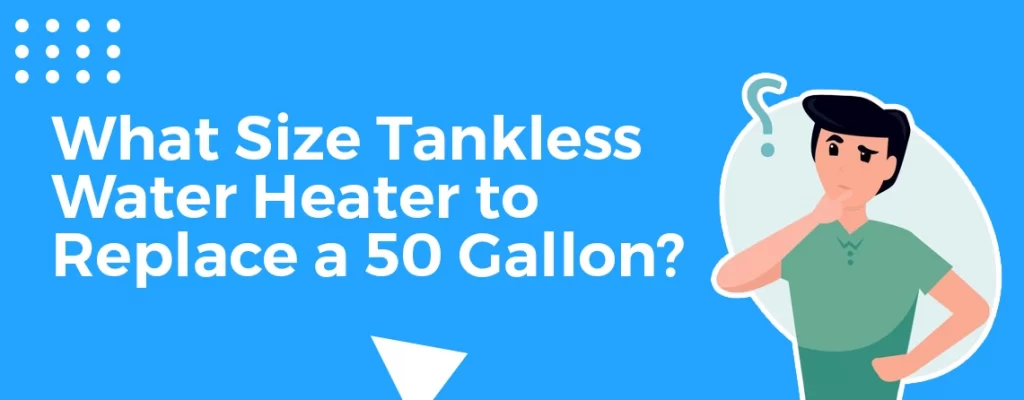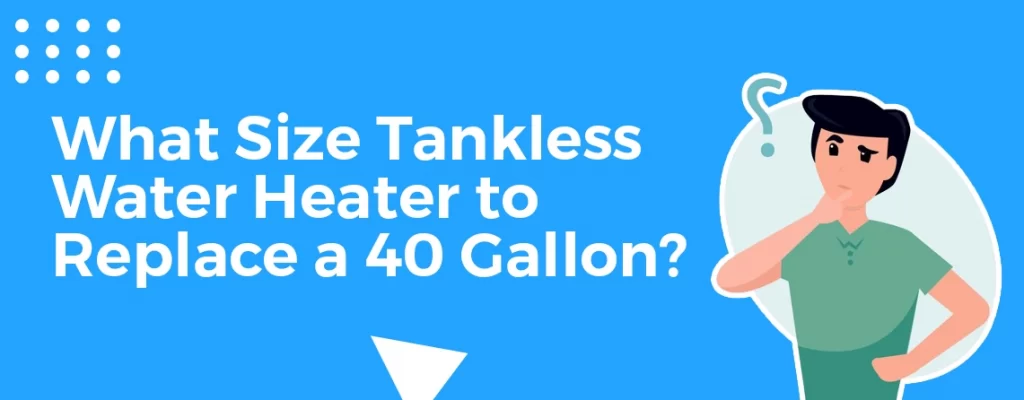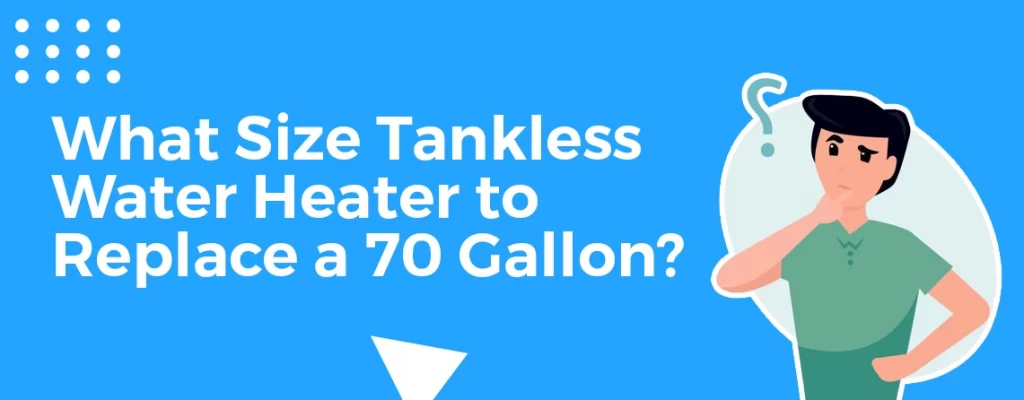What Size Tankless Water Heater do I Need? – The Size Guide
Confused about the size of tankless water heaters and want to get the answer to the question what size tankless water heater do I need? Well, to be honest, I can understand how difficult it is to find the size of a tankless water heater that can support your needs accurately especially when you are bound due to budget and number of family members. But don’t worry as by calculating a few factors you will be able to find the size of a tankless water heater that will fit your needs.
Moreover, if you are successful in calculating these factors then you can not only find the right size but can also save your money. One more thing that I want to disclose here is that there are some advantages and disadvantages of the tankless water heater which I am going to explain later on. Hopefully, they will help you when you are about to select the tankless water heater.
What Size Tankless Water Heater Do I Need – Explained
The size of a tankless water heater depends majorly on one’s use. If your use is more than average then you will need a tankless water heater with an excessive size that can handle more GPM. For the people who don’t know what GPM is, let me explain the term first. GPM stands for the gallon per minute. In easy words, it is also known as flow rate.
Hopefully, you understood this term. Now, if your family is bigger then it’s a known fact that you will definitely need a larger GPM. As the house with more people will require more GPM thus this is an important factor to watch out for.
But if your family is small then there is no need to spend a huge amount on the big tankless water heater as the smaller tankless water heater will also work the same and you can save your money.
So before you extend your hand and buy some giant tankless water heater, give a look to your needs first. In addition to this, GPM is also related to the number of fixtures you are going to connect with a tankless water heater. Fixtures include shoes, wash basin tap, washing machine connection, etc.
If you are connecting a large number of fixtures to the tankless water heater then you would need a larger water heater with a higher GPM. But if the number of fixtures is less then you will need a smaller tankless water heater.
To calculate the GPM add all the faucets and make an estimate of how many gallons will be used from each faucet. Determine the number of fixtures you want to connect with a tankless water heater and then determine which faucet will use how much GPM. Add those GPMs and the result will give you the size of tankless water heater you need.
Let me give you an example here that might help you understand this system more. Suppose the fixtures you want to attach to the water heater are: a washing machine, 2 faucets, and one shower head. The faucets take around 2 gallons of water, the washing machine takes 3 gallons of water and the shower head takes 4 gallons of water then the total GPM would be 9.
Another most important thing to calculate before you select the water heater is the temperature difference. Well, calculating it is really simple, just measure the groundwater temperature and subtract it from the temperature of the tankless water heater. The more the difference the fewer faucets will be provided by the tankless water heater and vice versa.
If you are still confused about which size will suit you the best then let me explain it with some examples. Consider these examples and then calculate how many gallons of water are in your use. Hopefully, after that, you will have to make an estimate of the size of the tankless water heater you need.
What Size Tankless Water Heater to Replace a 50 Gallon

For 50 gallons it is estimated that a 10 GPM tankless water heater would be the best. This is not an accurate calculation but 10 GPM acts best according to the experience of several users. So if you want to replace 50 gallons of water with a tankless water heater then make sure to buy a heater that can accommodate around 10 GPM. In some cases, users have also reported that 7 GPM also works great.
What Size Tankless Water Heater to Replace a 40 Gallon

To replace 40 gallons of water you will need around 3.5 GPM tankless water heater. In some cases, customers have also reported that 5 GPM also works its best. But if you are sure that you would not use any extra fixtures then buying a 5 GPM tankless water heater will be the best idea.
What Size Tankless Water Heater to Replace a 70 Gallon

To replace 70 gallons of water heater with a tankless heater one would need around 25 to 30 GPM tankless water heater. The numbers between them will work the best. Even if you add an extra fixture to this tankless heater it will work well as this on-demand water heater is giant enough to support the extra water flow.
Now you must be wondering why people buy tankless water heaters when they can manage to have tank water heaters as it supports an enormous number of fixtures, right? Well, there are plenty of reasons why people support tankless systems and the most important one is that it’s an innovation and there is no doubt that innovation is always better. So let’s go through a quick comparison between tankless water heaters and tank water heaters.
Tank Water Heaters
Tank water heaters are giant in size. They are not compact and take up a lot of space. Although Tank water heaters are less costly and even their installation does not cost much, the only drawback about tankless water heaters is that they reserve a lot of hot water inside them even if there is no need for such hot water. Thus scaling and other harmful bacteria generated inside the tank can be harmful. Now go through the pros and cons to understand better.
Pros
- It is less costly and anyone can afford it. Moreover, Its installation is also less costly.
- Their manufacturing is pretty simple and if anything goes wrong you can repair it yourself and even if you hire a plumber it won’t cost much for you.
Cons
- If your home is space restricted then the tank water heaters can cause a little problem for you as they are giant.
- They generate high utility bills. Although they are less expensive, in the long run, due to their reheat technology they create more utility bills.
- Its life span is short. Let me say that its life is half that of a tankless water heater.
On-Demand Water Heaters
Now let’s talk about the tankless water heaters. These heaters are slimmer and take less space on the wall. After all, who doesn’t like compact designs, right? So even if you are restricted with the space you don’t need to worry at all.
Moreover, these tanks might be expensive in the first place but in the long run, they will cost you less, so if you are on a budget I would say that extend your budget a little as this is gonna serve you best in the long term and you will thank me later.
If you’re still getting skeptical about whether to buy the tankless water heater or not then let me tell you that everything comes with pros and cons. Firstly I will explain to you some of the basic pros of the water heater and then we will jump into the cons. Stay along and keep on reading.
Pros
- As you all know that a tankless water heater does not store any water in it, this can be a major positive side, how? Well, the residues of the water will not make the interior of this heater corrode and the heater will stay rust-free for years and will require less maintenance.
- Secondly, as no water is stored thus you will get fresh hot water instead of recycled hot water which creates a smell in most cases.
- These tankless water heaters are more efficient. As this is a new technology it is more environmentally friendly than the tank water heater. It saves power much more than the tank water heaters and can help the owner save huge amounts on a yearly basis.
- The tankless water heater lasts longer than the tank water heater and demands less maintenance. It is around 15 years easily on average with proper maintenance.
- Slimmer than a tank water heater attached to the wall probably takes less space and is presentable.
- You don’t have to wait for 15 to 20 seconds before the water gets hot as in the tank water heaters. As soon as you turn on the tap all you will find is hot water.
Cons
- The Major con of keeping the tankless heater is that you will not have any water reservoir especially if the electricity goes out. You will run out of hot water and will not be able to get any until the electric supply returns.
- Excessive scaling occurs due to the hot water and you have to keep an eye over it to avoid any mishap.
- Tankless water heaters are however higher in price than tank water heaters. This is because it’s a new technology but in the long run it saves the money of the owner.
- The installation price of the tankless water heaters is much more than the tank water heaters.
- If somehow you use extra water than the fixed GPM, you will run out of hot water.
One thing that I would say here is that if you are budget free then go for the on-demand water heaters as they will save up your money in the future and you will not require to keep an eye over them as it requires no maintenance. Moreover, you can rely on it for 15 to 20 years.
Statistics of Tank and Tankless Water Heaters
According to the statistics, homes, where hot water usage is not more than 42 gallons, should consider using tankless water heaters as then these on-demand tankless water heaters can save up energy up to 24 percent to 34 percent. This will be cost-efficient for the people who don’t require hot water so much on a daily basis.
Moreover, if people with less usage of hot water consider using on-demand water heaters, then they can save up to $100 annually, only if the water heater used by them is gas based. But if the tankless water heater used by them is electrical then they can save up to $44. Isn’t it amazing that only a one-time investment can save your money for multiple years and gives you maintenance convenience well?
Gas over Electric?
This is the question asked by a lot of people. That’s why I am adding it under the heading. Do you want to go expensive or wanna stay economical? Well, who doesn’t like economics even if the bank accounts are full? That’s the reason people choose gas-powered demand water heaters over electric heaters.
Then why are they manufacturing electric heaters? Obviously, It doesn’t mean that electric water heaters are not in use. Actually, electric heaters are more suitable for small cabins or a single faucet and half bath installation.
But they will cost you more if you use them for a whole house. If you want to connect whole house fixtures with the water heater then it’s better that you use a gas-powered tankless water heater. It will cost you economically.
Working of On Demand Water Heaters
This is the most innocent question asked by my followers: how does the tankless water heater work? Where does it store the water and how does it warm up the water? Well, it’s clear from the name that “tankless” water heaters do not have a tank but then how do they store water to warm it up right?
Well, as soon as the water passes through the tubes of the water heater it detects the flow and warms up the water on the spot thus when the water leaves the tap you will find the hot water according to your demand. That’s how the on-demand water heater operates.
Tankless Water Heater Selection
If you are considering buying a tankless water heater whether from the market or online just check the list provided by the company. This list has flow rate (GPM) and temperature rise combined. As you have calculated your fixtures and the GPM it will be easy for you to select the size from there. If you are still confused then contact the company’s customer service from which you are considering buying a tankless water heater and they will help you.
Flow Rate and Temperature set of Various Companies
Almost every company that manufactures on-demand water heaters has the same GPM and flow rate. They follow the standard temperature set throughout their series. There are minor changes that the companies which are lower in price might have trouble with temperatures and GPM but all the branded manufacturers make sure to follow the same standard list.
FAQs
Can you oversize a tankless water heater?
Oversizing a tankless water heater is useless if your family is small. It will not only increase the cost but also the maintenance of the heater would be difficult. Not only this but the energy will also be wasted along with water. Therefore it is better to stick to the size that suits your family the best.
What is the downside of a tankless water heater?
The major downside of the tankless water heater is it costs 3 times more than the tank water heater. This is not all, its installation is also pretty expensive and people with a certain budget cannot afford it.
Can a tankless water heater fill a bathtub?
Yes, definitely it can fill up a bathtub if you are using an upsize tankless water heater. But if the size of the water heater is small then it would be difficult for it to fill the bathtub with hot water as other faucets are also attached to the heater.
What is the lifespan of a tankless water heater?
The average lifespan of the tankless water heater is 15 to 20 years. But if you maintain it properly it can last even longer than this. Just clean the scale generated inside the tankless water heater every 3 months so that it does not generate any bacteria and fungus inside the unit.
How noisy is a tankless water heater?
Tankless water heaters are not too noisy, at least they do not produce irritating noise. Basically, the noise is measured in decibel meters and the noise produced by tankless water heaters is less than 90 decibels which means it does not participate much in noise pollution.
What brand of water heater is the most reliable?
A.O Smith, Rheem, and Kenmore are the top three brands of tankless water heaters. Their units are not just durable but are easy to install as well. However, these brands are expensive but you can rely on them for years without even taking care of maintenance.
Conclusion
I will wrap up this whole article for you in a sentence that selecting a size depends on four major factors: the number of fixtures that will be used, the number of people in the house, the temperature difference between the groundwater temperature and water heater temperature, and the GPM that is gallons per minute. If you have calculated all these factors then you will be able to find the right size for yourself. Lastly, don’t forget to consider the advantages and disadvantages of the tankless water heater mentioned above.
Hey, I’m Adam Miller. After years of crawling through cramped basements fixing water heaters (and discovering some pretty questionable DIY attempts), I figured it was time to share what I’ve learned in a way that doesn’t involve me getting covered in dust. I started this site to help you make sense of the whole tankless water heater thing—whether you’re tired of cold showers or just want to save a few bucks on your energy bill. I like to keep things simple, practical, and if I can throw in a bad joke or two along the way, even better!